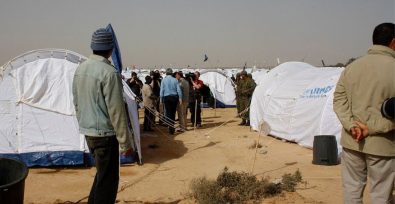The discovery of mass graves in Libya, where dozens of migrants’ bodies have been unearthed—some with gunshot wounds—has once again exposed the brutal conditions faced by those trapped in the country’s detention system. The International Organization for Migration (IOM) has called for an urgent investigation into the killings, but the larger picture remains unchanged.
This is not an isolated incident. It is part of a longstanding pattern of disappearances, torture, and executions in Libya, a country where migrants and refugees have become collateral damage in a system worsened by European migration policies. The timing of this latest revelation is particularly damning—just weeks after Italy helped a wanted Libyan official, accused of crimes against humanity, evade arrest.
A deadly pattern of abuse
The graves were found in Jakharrah, about 400 kilometers south of Benghazi, and in Kufra, a desert region where authorities believe as many as 70 bodies could be buried. Some of the victims had been shot, confirming previous reports of extrajudicial killings of migrants in Libya.
According to Al Jazeera,
“Migrants and asylum seekers, including children, arbitrarily detained in facilities controlled by armed groups affiliated with both governments or smugglers and traffickers, suffered inhumane conditions, torture, forced labor, and sexual assault.”
Last year, a similar mass grave was uncovered in Shuayrif, where the bodies of at least 65 migrants were found. The IOM has documented more than 965 recorded migrant deaths in Libya in 2024 alone, but the real number is likely far higher. Many of those who die in Libya’s detention system or on its dangerous land routes are never accounted for.
Italy’s complicity—and Europe’s silence
The exposure of these mass graves follows Italy’s recent decision to release Osama Al-Masri, a Libyan police chief accused of overseeing torture, rape, and executions of migrants in Libya’s notorious detention centers. Arrested in Italy under an International Criminal Court (ICC) warrant, Al-Masri was released on a legal technicality and flown back to Libya on an Italian government jet.
For survivors, the message was clear: the system that enables their exploitation and abuse remains firmly in place. Lam Magok Biel Ruei, a South Sudanese survivor of Libya’s detention camps, has since filed a legal complaint against the Italian government, accusing it of aiding and abetting a war criminal. “The Italian government has made me a victim for a second time [of] these atrocities I have witnessed,” Magok said after filing his complaint.
Europe’s role in the crisis
Despite overwhelming evidence of human rights violations, the European Union continues to support Libya’s migrant detention system. In exchange for financial and technical assistance, the Libyan coast guard intercepts migrant boats and returns people to detention centers where forced labor, sexual violence, and systematic killings are routine.
The discovery of these graves is not just a Libyan crisis—it is a European one. By outsourcing border control to a country where human rights abuses are rampant, the E.U. is not just complicit—it is actively enabling these atrocities. The agreement between the E.U. and Libya must end.







Freedom United is interested in hearing from our community and welcomes relevant, informed comments, advice, and insights that advance the conversation around our campaigns and advocacy. We value inclusivity and respect within our community. To be approved, your comments should be civil.